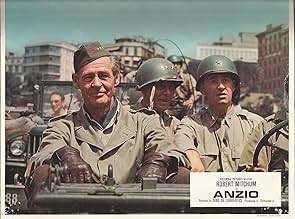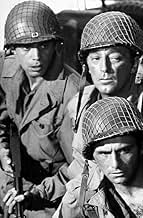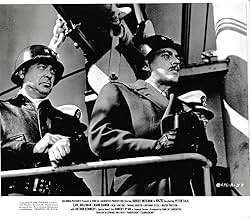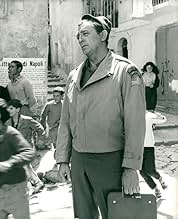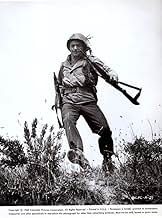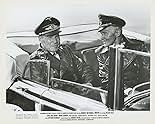Füge eine Handlung in deiner Sprache hinzuA war correspondent witnesses errors made at Allied Command after he and a unit of US Army Rangers land unopposed at Anzio, Italy, but later become trapped behind German lines during one of ... Alles lesenA war correspondent witnesses errors made at Allied Command after he and a unit of US Army Rangers land unopposed at Anzio, Italy, but later become trapped behind German lines during one of the bloodiest battles of WWII.A war correspondent witnesses errors made at Allied Command after he and a unit of US Army Rangers land unopposed at Anzio, Italy, but later become trapped behind German lines during one of the bloodiest battles of WWII.
Empfohlene Bewertungen
ANZIO isn't an awful film but it's far from being a great one either with the script being the major problem . It opens one of those light hearted scenes of with over paid , over sexed and over confident US soldiers that we've seen far too many times before . I guess it's supposed to be amusing but it's not . Eventually the film lives up to its title and shows us what went wrong at the Anzio landings with the American generals Clark and Lucas not driving inland quick enough . This is a fairly good history lesson since it paints a fairly poor picture of American leadership in Italy . Remember in SAVING PRIVATE RYAN , BAND OF BROTHERS and A BRIDGE TOO FAR Monty is painted as possibly the most incompetent allied General of the war ? This was nothing compared to the ridiculous mistakes made by Clark and Lucas during the Italian campaign , though somewhat cowardly this film renames Clark as " Carson " and Lucas as " Lewis " which is a great pity because a history student could do worse than watch this film , though if they did they'd notice like a great number of war films made during this period ( BATTLE OF THE BULGE is a good example ) that both German and American tanks are from a different generation but the Anzio landings here are more accurate than the ones seen in PINK FLOYD THE WALL
After this the narrative then sadly settles down into a straightforward war film where the action could basically have taken place anywhere like France or the Phillipines where a bunch of GIs are surrounded by the enemy and have to make it back to enemy lines . As many people have pointed out on these pages the script is rather unfocused and slightly disjointed and I had a gut feeling that some of it ended up on the cutting room floor , for example we see the platoon escape from a house at night and almost immediately after the platoon are trapped by some German snipers in the middle of the day , though to be honest this isn't a movie that is afraid to kill off characters so deserves some credit alongside the historical accuracy
The film stars Robert Mitchum ("The Enemy Below") as Dick Ennis, a cold and cynical war correspondent that does his work on the front lines with the infantrymen. When the squad he is accompanying gets cut off behind the German lines due to an ambush, he must pick up a gun and help them fight their way back to Allied lines.
The movie has a lot going for it, right from the start. Every actor looks comfortable, especially Mitchum. Robert Mitchum has never been one of my favorite American actors, simply because he always seems to be acting despite the dimensionality of the part, Mitchum can never seem to break out of a box. Here, he looks to be having plenty of fun and seems quite natural in the role. Mark Damon ("Between Heaven and Hell") provides the necessary dramatic opposite as an infantryman who can't seem to agree with Ennis on his policies. Arthur Kennedy ("Attack and Retreat") is the exact opposite of Ennis' character as the incompetent General Lesley, who takes too much time establishing a solid beachhead and allows the Germans to launch an offensive, pinning his men down on the beach. Peter Falk ("Situation Normal, All Fouled Up"), on the other hand, is totally wasted as Corporal Rabinoff, a soldier who has become addicted to combat. Earl Holliman ("Armored Command") is the Sergeant in command of the squad, and he makes the most out of a clichéd-role by giving his character personality. Be sure to watch for Robert Ryan, Anthony Steel, Arthur Franz and Patrick Magee as Allied Generals.
There is only one big battle sequence, which expertly staged and filled with tanks, extras and big explosions. However, its effectiveness is limited because of two key flaws. Primarily, American soldiers are seen to stand up in the open and rush German machine-gun nests, only to be mowed down by overwhelming enemy fire. Secondly, there's a ridiculous scene in which Ennis and a soldier engage in a discussion about the war right in the middle of a fight, despite the fact that bullets and artillery shells are landing all around them! The final, small-scale, climactic showdown with German snipers was much more suspenseful, due to some excellent editing and great music score.
One major flaw in the film is, unfortunately, the script. It's as if "Anzio" can't decide if it wants to be a gung-ho flag-waver, or a downbeat, anti-war story. The first half the film is filled with humorous, almost slapstick scenes, although some of Mitchum's dialog hints that this is going to change and it does, in fact the focus turns around 180 degrees. Throughout the second half of the film, the action stops dead in its tracks so that the characters discuss issues of personal sacrifice, what constitutes above and beyond the call of duty, etc until it's been repeated so much that you can't stand to hear anymore. For all of this discussion, the conclusion is pretty forced. Mitchum says something along the lines of, "Men kill each other because they like to. Maybe if we all sit back and realize it, we could stop the killing and get along." That statement defines over-emphasis. Instead of being a history lesson about the real Anzio campaign, the film turns into a social commentary on Vietnam.
The on-location shooting served the proceedings well, as the film looks like sunny Italy in every frame. The scene in the Italian house looked excellent, and Dmytryk uses wide angles throughout to show off the scope of the Italian locales. The score ranges from victorious and rousing to mournful and depressing, which contributes a great deal to the mood of some important scenes such as the entry into liberated Rome and the significance of one character's death in the sniper sequence.
"Anzio" is a mixed bag, but despite a lack of focus on one theme, it manages to be entertaining and satisfying as a drama, with enough well-staged action scenes to hold it together and help obscure the muddled anti-war sentiments.
The motion picture was partially based on real events : As Operation Shingle (January 22, 1944) was an Allied amphibious landing in the Italian Campaign against German forces in the area of Anzio, Italy. This operation was aimed at outflanking the German army on the Winter Line and as such allow for an assault on the capital city of Rome . It was one of WWIIs bloodiest battles as the Allies smash through the German lines which have enclosed the Anzio beachhead . The operation was commanded by American Major General John P. Lucas (Arthur Kennedy) and was intended to outflank German forces of the Winter Line and enable an attack on Rome. The resulting combat is commonly called the Battle of Anzio.The success of an amphibious landing at that location, in a basin consisting substantially of reclaimed marshland and surrounded by mountains, depended completely on the element of surprise and the swiftness with which the invaders could move relative to the reaction time of the defenders. Any delay could result in the occupation of the mountains by the defenders and the consequent entrapment of the invaders. Lieutenant General Mark Clark (Robert Ryan as General Carson) , commander of the U.S. Fifth Army, understood that risk, but Clark did not pass on his appreciation of the situation to his subordinate, General Lucas, who preferred to take time to entrench against an expected counterattack. The initial landing achieved complete surprise with no opposition and a jeep patrol even made it as far as the outskirts of Rome. Despite that report, Lucas, who had little confidence in the operation as planned, failed to capitalize on the element of surprise by delaying his advance until he judged his position was sufficiently consolidated and his troops ready. While Lucas consolidated, Field Marshal Albert Kesselring (Wolfgang Preiss) , the German commander in the Italian theatre, moved every spare unit to be found into a ring around the beachhead, where his gunners had a clear view of every Allied position. The Germans also stopped the drainage pumps and flooded the reclaimed marsh with salt water, planning to entrap the Allies and destroy them by epidemic. For weeks a rain of shells fell on the beach, the marsh, the harbour, and on anything else observable from the hills, with little distinction between forward and rear positions. After a month of heavy but inconclusive fighting, Lucas was relieved , sent home and replaced by Major General Lucian Truscott. The Allies finally broke out and turned his forces north-west towards Rome which was captured on 4 June. As four months and 30,000 casualties before the Allies finally march to Rome . As a result, the forces of the German Tenth Army at Cassino were able to withdraw and rejoin the rest of Kesselring's forces north of Rome, regroup, and make a fighting withdrawal to his next major prepared defensive position on the Gothic Line
Wusstest du schon
- WissenswertesPeter Falk in his 2006 autobiography "Just One More Thing: Stories of My Life" stated that he didn't like the script for this film, finding it hackneyed and full of cliché; he wanted to leave the film for these reasons. However, producer Dino De Laurentiis encouraged him to stay by giving him film-poster name-above-the-title credit as well as choice of writer for his dialogue. Falk stayed on the picture and apparently actually wrote his own dialogue.
- PatzerToward the beginning of the film, Cpl. Jack Rabinoff (Peter Falk) is in the back of a Red Cross ambulance with three prostitutes and grabs a shoebox-sized box labeled "Hershey's Milk Chocolate Multi Pack" with a "1968 design" of the Hershey logo. One of the prostitutes reaches into the box and pulls out a "1968 design" box of Brach's Milk Chocolate Stars. In addition to the two anachronisms, Hershey's and Brach's are two separate companies.
- Zitate
Dick Ennis: [attending to Rabinoff who went into sudden convulsions] Look, fellows, I think he can use the air more then the company, okay? Anything anybody can do?
Cpl. Jack Rabinoff: No, unless you have a band-aid.
Dick Ennis: Very funny.
Cpl. Jack Rabinoff: Oh, it's murder. The stomach, you see? A Japanese grenade ripped my insides. Got medal in there. Under tension it contracts and all hell breaks loose. I must have been tense.
Dick Ennis: Good thinking. You belong in a hospital, not in a war.
Cpl. Jack Rabinoff: Yeah, that's what they said when they sent me home.
Dick Ennis: You mean you got out, then you went to Canada and joined this outfit?
Cpl. Jack Rabinoff: That's right.
Dick Ennis: How did you get past the doctors?
Cpl. Jack Rabinoff: Lied about my age.
Dick Ennis: You gotta be crazy. Half your guts blown out and you're back here. What for?
Cpl. Jack Rabinoff: Awkward time for a interview.
Dick Ennis: You got something better to do? Why did you re-enlist?
Cpl. Jack Rabinoff: Why? Because I like it, you know. I missed it, Ennis. With all the mud and pain, these clowns giving orders, there's nothing like it. Look, a guy sells shoes for 40 years. I live more in one day, I see more and feel more. I taste more, I think more. I'm more, understand? I'm more. There's more to living than breathing. Capisce?
Dick Ennis: Capisce.
Cpl. Jack Rabinoff: You're the same way, that's right. War is part of you. You belong to it and when this one's over, you'll find another and I hope I'm with you.
- VerbindungenReferenced in The Carol Burnett Show: Nanette Fabray and Steve Lawrence (1970)
Top-Auswahl
- How long is Anzio?Powered by Alexa
Details
- Erscheinungsdatum
- Herkunftsländer
- Sprachen
- Auch bekannt als
- Anzio
- Drehorte
- Royal Palace, Caserta, Campania, Italien(opening scene)
- Produktionsfirmen
- Weitere beteiligte Unternehmen bei IMDbPro anzeigen
- Laufzeit1 Stunde 57 Minuten
- Seitenverhältnis
- 2.35 : 1
Zu dieser Seite beitragen




